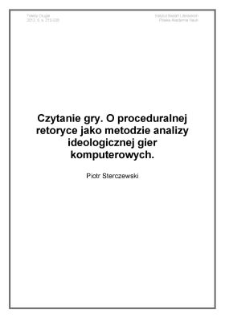
Object
Title: Czytanie gry. O proceduralnej retoryce jako metodzie analizy ideologicznej gier komputerowych
Subtitle:
Publisher:
Place of publishing:
Description:
21 cm ; Tekst pol., streszcz. ang.
Type of object:
References:
1. E. Aarseth, Genre Trouble: Narrativism and the Art of Simulation, http://www.electronicbookreview.com/thread/firstperson/vigilant, tłum. własne, [dostęp: 20 czerwca 2012].
2. I. Bogost, Persuasive Games. The Expressive Power of Videogames, MIT Press, Cambridge–London 2007, s. 4.
3. J. Dovey, H. Kennedy, Kultura gier komputerowych, przeł. T. Macios, A. Oksiuta, Wydawnictwo UJ, Kraków 2011.
4. G. Frasca, Ludolodzy też kochają opowiadania – notatki na temat sporu, który nigdy nie miał miejsca, przeł. M. Filiciak, w: Światy z pikseli. Antologia studiów nad grami komputerowymi, red. M. Filiciak, Wydawnictwo SWPW Academica, Warszawa 2010, s. 78-89.
5. H. Lausberg, Retoryka literacka. Podstawy wiedzy o literaturze, przeł. A. Gorzkowski, Homini, Bydgoszcz 2002, s. 40.
6. S. Lee, “I Lose, Therefore I Think”. A Search for Contemplation amid Wars of Push-Button Glare, „Game Studies” vol. 3 issue 2, December 2003, tłum. własne, http://www.gamestudies.org/0302/lee/ [dostęp: 02.06.2012].
7. T. Majkowski, Złote runo. Gra wideo jako doświadczenie interpretacyjne, w: Olbrzym w cieniu. Gry wideo w kulturze audiowizualnej, red. A. Pitrus, Wydawnictwo UJ, Kraków 2012, s. 187.
8. J. McGonigal, Reality is Broken. Why Games Make Us Better and How They Can Change the World, Penguin Press, New York 2011, tłum. własne, s. 66-67.
9. D. Michael, S. Chen, Serious Games: Games That Educate, Train, and Inform, Thomson Course Technology, Boston 2006,s. 21.
10. J. Murray, Hamlet on the Holodeck. The Future of Narrative in Cyberspace, Free Press, New York 1997, s. 71.
11. J. Raessens, Serious games from an apparatus perspective, w: Digital Material. Tracing New Media in Everyday Life and Technology, ed. M. van den Boomen et al. ,Amsterdam University Press, Amsterdam 2009, s. 21-34.
12. J. Stasieńko, Alien vs. Predator? Gry komputerowe a badania literackie, Wydawnictwo Naukowe Dolnośląskiej Szkoły Wyższej Edukacji TWP, Wrocław 2005.
13. J.Z. Szeja, Gry fabularne. Nowe zjawisko kultury współczesnej, Rabid, Kraków 2004, s. 155.
14. D. Urbańska, Homoplayers. Strategie odbioru gier komputerowych, Wydawnictwo Akademickie i Profesjonalne, Warszawa 2009.
15. M. White, Ideological Analysis and Television, tłum. własne, w: Channels of Discourse, Reassembled. Television and Contemporary Criticism, ed. R.C. Allen, University of North Carolina Press, London 1992.
16. S. Žižek, Cyberspace, or, How to Traverse the Fantasy in the Age of the Retreat of the Big Other, „Public Culture” 10(3) 1998, tłum. własne, s. 484.
17. S. Žižek, The Interpassive Subject, http://www.egs.edu/faculty/slavoj-zizek/articles/the-interpassive-subject/, tłum. własne, dostęp: 12.06.2012.
Relation:
Issue:
Start page:
End page:
Detailed Resource Type:
Format:
Resource Identifier:
oai:rcin.org.pl:48357 ; 0867-0633
Source:
IBL PAN, call no. P.I.2524 ; click here to follow the link
Language:
Language of abstract:
Rights:
Terms of use:
Copyright-protected material. May be used within the limits of statutory user freedoms
Digitizing institution:
Institute of Literary Research of the Polish Academy of Sciences
Original in:
Library of the Institute of Literary Research PAS
Projects co-financed by:
Programme Innovative Economy, 2010-2014, Priority Axis 2. R&D infrastructure ; European Union. European Regional Development Fund
Access:
Object collections:
- Digital Repository of Scientific Institutes > Partners' collections > Institute of Literary Research PAS > Serials
- Digital Repository of Scientific Institutes > Literature > Journals/Articles
Last modified:
Oct 2, 2020
In our library since:
Oct 3, 2014
Number of object content downloads / hits:
11418
All available object's versions:
https://rcin.org.pl/publication/65796
Show description in RDF format:
Show description in RDFa format:
Show description in OAI-PMH format:
| Edition name | Date |
|---|---|
| Sterczewski P. - Czytanie gry. O proceduralnej retoryce jako metodzie analizy ideologicznej gier komputerowych | Oct 2, 2020 |
Objects Similar
Garda, Maria B. Krawczyk, Stanisław
Rorot, Wiktor
Krawczyk, Stanisław Sterczewski, Piotr Kominiarczuk, Mateusz
Marak, Katarzyna Markocki, Miłosz

 INSTYTUT ARCHEOLOGII I ETNOLOGII POLSKIEJ AKADEMII NAUK
INSTYTUT ARCHEOLOGII I ETNOLOGII POLSKIEJ AKADEMII NAUK
 INSTYTUT BADAŃ LITERACKICH POLSKIEJ AKADEMII NAUK
INSTYTUT BADAŃ LITERACKICH POLSKIEJ AKADEMII NAUK
 INSTYTUT BADAWCZY LEŚNICTWA
INSTYTUT BADAWCZY LEŚNICTWA
 INSTYTUT BIOLOGII DOŚWIADCZALNEJ IM. MARCELEGO NENCKIEGO POLSKIEJ AKADEMII NAUK
INSTYTUT BIOLOGII DOŚWIADCZALNEJ IM. MARCELEGO NENCKIEGO POLSKIEJ AKADEMII NAUK
 INSTYTUT BIOLOGII SSAKÓW POLSKIEJ AKADEMII NAUK
INSTYTUT BIOLOGII SSAKÓW POLSKIEJ AKADEMII NAUK
 INSTYTUT CHEMII FIZYCZNEJ PAN
INSTYTUT CHEMII FIZYCZNEJ PAN
 INSTYTUT CHEMII ORGANICZNEJ PAN
INSTYTUT CHEMII ORGANICZNEJ PAN
 INSTYTUT FILOZOFII I SOCJOLOGII PAN
INSTYTUT FILOZOFII I SOCJOLOGII PAN
 INSTYTUT GEOGRAFII I PRZESTRZENNEGO ZAGOSPODAROWANIA PAN
INSTYTUT GEOGRAFII I PRZESTRZENNEGO ZAGOSPODAROWANIA PAN
 INSTYTUT HISTORII im. TADEUSZA MANTEUFFLA POLSKIEJ AKADEMII NAUK
INSTYTUT HISTORII im. TADEUSZA MANTEUFFLA POLSKIEJ AKADEMII NAUK
 INSTYTUT JĘZYKA POLSKIEGO POLSKIEJ AKADEMII NAUK
INSTYTUT JĘZYKA POLSKIEGO POLSKIEJ AKADEMII NAUK
 INSTYTUT MATEMATYCZNY PAN
INSTYTUT MATEMATYCZNY PAN
 INSTYTUT MEDYCYNY DOŚWIADCZALNEJ I KLINICZNEJ IM.MIROSŁAWA MOSSAKOWSKIEGO POLSKIEJ AKADEMII NAUK
INSTYTUT MEDYCYNY DOŚWIADCZALNEJ I KLINICZNEJ IM.MIROSŁAWA MOSSAKOWSKIEGO POLSKIEJ AKADEMII NAUK
 INSTYTUT PODSTAWOWYCH PROBLEMÓW TECHNIKI PAN
INSTYTUT PODSTAWOWYCH PROBLEMÓW TECHNIKI PAN
 INSTYTUT SLAWISTYKI PAN
INSTYTUT SLAWISTYKI PAN
 SIEĆ BADAWCZA ŁUKASIEWICZ - INSTYTUT TECHNOLOGII MATERIAŁÓW ELEKTRONICZNYCH
SIEĆ BADAWCZA ŁUKASIEWICZ - INSTYTUT TECHNOLOGII MATERIAŁÓW ELEKTRONICZNYCH
 MUZEUM I INSTYTUT ZOOLOGII POLSKIEJ AKADEMII NAUK
MUZEUM I INSTYTUT ZOOLOGII POLSKIEJ AKADEMII NAUK
 INSTYTUT BADAŃ SYSTEMOWYCH PAN
INSTYTUT BADAŃ SYSTEMOWYCH PAN
 INSTYTUT BOTANIKI IM. WŁADYSŁAWA SZAFERA POLSKIEJ AKADEMII NAUK
INSTYTUT BOTANIKI IM. WŁADYSŁAWA SZAFERA POLSKIEJ AKADEMII NAUK


































